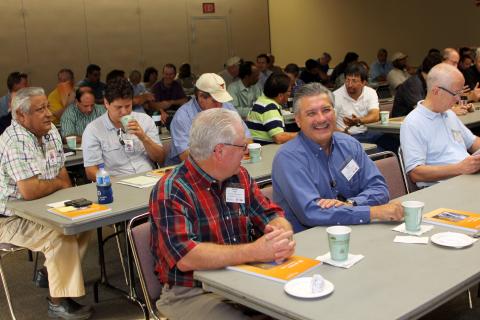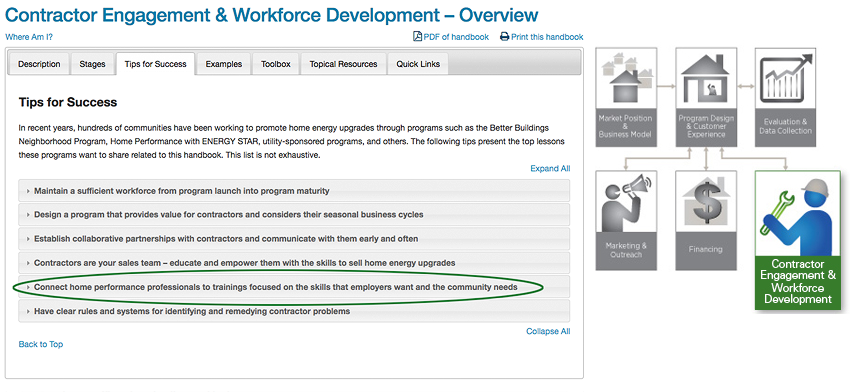
A comprehensive evaluation of over 140 programs across the United States found that more successful residential energy efficiency programs offered multiple training opportunities to contractors, either by delivering training or engaging with local partners to offer training. Providing access to technical, sales, and program training can enhance assessment quality, improve sales, increase the rate of conversion from assessment to upgrade, improve quality control, and contribute to more comprehensive upgrades, better installations, and increased revenues for contractors.
Many programs have successfully partnered with local education and training providers, such as community colleges, universities, and weatherization training centers, to offer technical training and professional development opportunities to the local workforce. By leveraging these partners’ capabilities to provide training, mentoring, and apprenticeship opportunities, residential energy efficiency programs can connect contractors and their technicians to the trainings focused on the skills that contractor employers want and the community needs. Apprenticeships also bridge the gap between classroom training and on-the-job experience.
Partner With Colleges to Offer Training and Apprenticeships 
The City of Philadelphia’s EnergyWorks program collaborated with the Community College of Philadelphia to design an apprenticeship program for energy efficiency and building science. EnergyWorks developed a network of trained, Building Performance Institute (BPI) certified professionals to conduct home energy assessments and upgrades. Two one-year programs— Building Energy Analyst and Weatherization Installer and Technician—led to journeyman credentials and BPI certification. These programs helped home performance professionals develop the technical building science skills they needed, while also providing hands-on experience with energy efficiency analysis and upgrade installations. Program graduates helped residents save an average of 20% to 30% on utility bills through weatherization and energy conservation services.
Match Your Training Approach to Meet Contractor Needs
As part of the city’s high-road workforce agreement, Community Power Works in Seattle piloted a new training approach based upon the needs of contractors and the agreement’s requirements. The group partnered with South Seattle Community College and nonprofit Northwest EcoBuilding Guild to offer classes and workshops and gather contractor feedback on training needs. The program offered training to both entry-level and experienced home performance professionals, and contractors were given the flexibility to hire a technician who is not fully trained or certified but has begun the certification process. This approach allowed contractors to select from a broader pool of candidates and provide supplemental training, subsidized by CPW, to those who needed it. As a result of these partnerships, about 40 training graduates worked approximately 23,000 hours on Community Power Works projects between April 2011 and December 2013.
Tell Me More
Discover more lessons learned on training to develop a skilled workforce by visiting the Better Buildings Residential Program Solution Center Contractor Engagement & Workforce Development – Assess the Market handbook for step-by-step guidance and program examples.
Haven’t used the Residential Solution Center before? Get started here!
